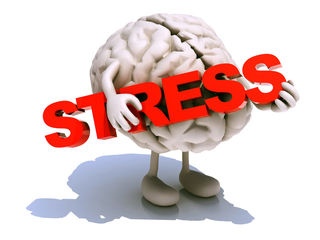OCD
The Best TED Talks for People with OCD: Part 3
How you think about the stress response matters.
Posted September 19, 2018
For the third installment in this blog series on the best TED Talks for people with OCD, I’m going to showcase one of the talks I show most frequently to my therapy clients: "How to make stress your friend" by Kelly McGonigal. Even though Dr. McGonigal never mentions OCD, implementing her recommendations can make a lasting positive impact on your OCD recovery.
A Killer Belief
She begins the talk by discussing research that changed her view of stress. Explaining the results of the study, she says, “People who experienced a lot of stress in the previous year had a 43 percent increased risk of dying. But that was only true for the people who also believed that stress is harmful for your health… Now the researchers estimated that over the eight years they were tracking deaths, 182,000 Americans died prematurely, not from stress, but from the belief that stress is bad for you.”
You read that right: the belief about stress was what killed people, not the stress itself. In fact, she continues, “…if that estimate is correct, that would make believing stress is bad for you the 15th largest cause of death in the United States last year, killing more people than skin cancer, HIV/AIDS and homicide.”
Now, I’m not sharing this to make your OCD get all upset about whether you, too, are going to die because you think stress is bad for you. (Tell your OCD we will address its concerns in a minute, but right now you are reading this blog post and are too busy to do a compulsion!) I’m sharing this because how we think about what is happening in our bodies matters.

Stress and Anxiety
As Dr. McGonigal shares in her book The Upside of Stress: Why Stress Is Good for You, and How to Get Good at It, “Stress is what arises when something you care about is at stake.” Anxiety is the physical response that then occurs when you feel stress.
When you have an OCD episode, OCD is telling you that something you care about is in jeopardy, so you go into the stress response, also known as the fight-or-flight response, where your body starts secreting all the chemicals necessary to get you prepared to get away from danger. Except that there isn’t any real danger, because OCD is a misperception of threat. Those stress chemicals hang out because your OCD’s reactions to the intrusive thoughts keep telling your brain there is danger, so you feel the physical sensations of anxiety: pounding heart, shortness of breath, flashes of heat, sweaty palms, a feeling of pins and needles on your skin, etc...
No one enjoys these symptoms, because they can make us feel as if we really are in danger (something called emotional reasoning), even though we’re not. But new science now tells us that the way we relate to these sensations can have a profound impact on our health and wellbeing.
A Transformation to Joy
Dr. McGonigal says in her talk, “…In a typical stress response, your heart rate goes up, and your blood vessels constrict like this. And this is one of the reasons that chronic stress is sometimes associated with cardiovascular disease. It's not really healthy to be in this state all the time. But in the study, when participants viewed their stress response as helpful, their blood vessels stayed relaxed like this. Their heart was still pounding, but this is a much healthier cardiovascular profile. It actually looks a lot like what happens in moments of joy and courage.”
She is saying that your response to the sensations of the fight-or-flight response can transform what your blood vessels are doing! Can you believe that?! Talk about the power of the mind-body connection!
But how in the world can you view the stress response as helpful, especially when it’s coming from an OCD reaction to an intrusive thought? You can do so by saying, “Oh, good! There’s my OCD again. I’m so glad it’s here, because I really wanted a chance to practice doing my exposure and response prevention therapy. I’m feeling the fight-or-flight response happening right now, and that’s okay. I can handle these sensations. In fact, if I embrace them without doing compulsions and tell myself I want to be anxious because that’s how I get better, I’m taking power away from OCD and winning this game. Bring it on, OCD! Bring it on!”
Is this easy? Nope. But is shifting your belief about anxiety an incredibly powerful tool that can strip away about 50% of OCD’s power if you practice it frequently? Yup, absolutely.
Chase Meaning
In my first blog post in this series about Susan David’s “The gift and power of emotional courage", I talked about her poignant quote, "Discomfort is the price of admission to a meaningful life.” At the end of Dr. McGonigal’s talk about transforming our relationship to stress, she says something similar: “…one thing we know for certain is that chasing meaning is better for your health than trying to avoid discomfort. And so I would say that's really the best way to make decisions, is go after what it is that creates meaning in your life and then trust yourself to handle the stress that follows.”
So the next time you have an intrusive thought, you feel anxious and OCD wants you to do a compulsion to “get rid” of the anxiety (which is a “dead person’s goal,” by the way… see installment one of this series to learn more), tell it you’re glad to be anxious because you are done chasing certainty. You are chasing meaning instead, and you can handle, and even embrace, the stress that will follow.
P.S. If your OCD is still waiting for me to get back to it about whether you’re going to die because of your belief about stress, read The Best TED Talks for People with OCD: Part 2, then put your shoulders back and act as though that intrusive thought is irrelevant. Then get back to doing something that creates meaning in your life!
For notifications of new blog posts as well as OCD-taming tips & resources, sign up for my Shoulders Back! newsletter.




